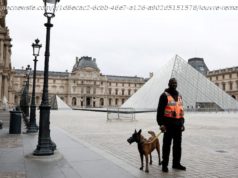Greek soldiers on Sunday began defusing a World War II bomb in the second city Thessaloniki after evacuating tens of thousands of people from the area.
The bomb, containing nearly 250 kilograms of explosives, was unearthed in the northern port city during road works last week. It is located near a petrol station.
A demining team was at the site but the start of the operation was delayed as police removed a camera placed above the crater by a Greek media outlet in breach of the guidelines to cover the event.
Some 70,000 people were targeted for evacuation within a 1.9-kilometre radius of the bomb site, affecting three working-class neighbourhoods west of the city-centre.
The operation is unprecedented in Greece, «where a bomb of this size has never been found in an area this densely populated,» Tzitzikostas added.
But shopkeeper Stelios Orphanos said Sunday that people in the area could remain at home if they stayed indoors until the bomb had been defused.
Many chose to do so «because they are scared of thieves,» he said.
Some of those evacuated complained. A woman in her eighties muttered as she was taken away: «There’s no reason to be scared, if the bomb had to go off it would have done so already. «
Local authorities say the operation could last the whole day.
But the army has hinted that it could take longer to defuse the bomb and then transport it to a firing range nearby.
According to Greek media reports, the bomb was dropped by a British plane during air strikes on the city’s nearby railway station and port in 1943.
The army however has not confirmed or denied the report.
Seven decades after the end of World War II, unexploded bombs from the conflict are still being found around the globe.
On January 23 dozens of people were evacuated after a bomb was found near a Hong Kong university, while three days before that Britain’s navy disposed of a suspected wartime bomb found close to the parliament in London.
In the German city of Augsburg, 54,000 people had an unwelcome Christmas surprise on December 25 when they had to leave their homes while authorities dealt with a bomb dropped by Britain during the war.






